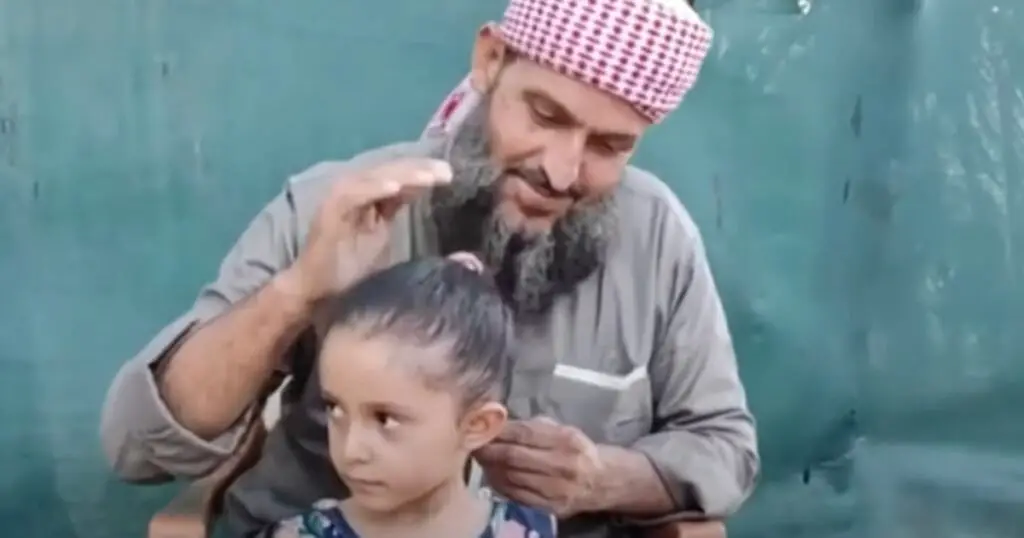Deir el-Balah, Gaza – Maysa Nabhan cries quietly in the living room and scrolls through her cell phone for pictures of her father Khaled Nabhan with her children.
“He was everything to us. He held this family together. When my children died, he was the one who comforted me every day,” she says in a broken voice as she wipes tears from her face with her hand.
Eight-year-old Ahmed sat next to his mother and burst into tears every time she cried, only calming down when she stopped or reached out a black-clad arm to comfort him.
“Grandpa is gone,” he repeated again and again through tears.
In a crowded house where she has sought refuge with Ahmed, Maysa has little space to mourn her father, who inadvertently became an icon of suffering in Gaza just over a year ago.
“Soul of my soul”
At 2 a.m. on November 29, 2023, Khaled Nabhan held the small, lifeless body of his granddaughter in the shattered remains of Deir al-Balah.
Three-year-old Reem and her five-year-old brother Tarek, the two youngest children of his eldest daughter Maysa, were killed in an Israeli airstrike.
He gently kissed Reem’s closed eyes and whispered that she was “Ruh al-ruh” (soul of my soul). The moment was captured on camera and made the 54-year-old grandfather an icon of suffering in Gaza.
It was a moment of peaceful surrender to God’s will that captured hearts everywhere.
Since then, more videos have been shared of Khaled Nabhan dealing with his loss and working to help as many people as possible.
He focused on comforting others, even comforting people from all over the world to offer their condolences.
When they lamented their inability to do anything to stop the bloodshed, he asked them to pray for Gaza.
“There is nothing more valuable than your prayers… pray that Allah is with us,” he told a tearful caller.

A symbol
The world watched Khaled Nabhan be himself. He fed stray cats – traumatized and starving like Gaza’s population – and played with his surviving grandchildren and his youngest daughter, 10-year-old Ratil, and cared for his elderly mother.
His son Diaa, 29, remembers how Khaled Nabhan continued to work as a laborer whenever he could find work, even though he himself was hungry and malnourished.
“He was working… and came over to take care of us,” Diaa remembers.
“But you would never know how much he struggled (during the war on Gaza). He starved himself to make sure we had enough to eat.”
After his farewell to Reem went viral, Khaled “turned into a one-man charity,” Diaa said.
As love and compassion poured in for him from around the world, he channeled that support to those in need, collecting tents, food, and clothing for those who had nothing.

On the rare occasions that Khaled did complain, it was about life in displacement and the humiliation it brought on others as Israel continued to block the entry of almost all aid into Gaza.
“There is no greater humiliation than this,” he said in February from the back of a horse-drawn wagon piled with his family’s belongings as he took them to Rafah, their second refugee site from which they eventually had to flee.
“People come to me for help when they don’t have even the bare minimum of clothing to protect themselves from the elements,” he said.
Then, around midday on Monday, Israel struck again, bombing the Nuseirat refugee camp and killing Khaled Nabhan.
His funeral, 14 months after he laid to rest his grandchildren, was seen in videos and social media posts around the world.

Many users shared his photos with Reem and commented, “Now he’s gone to her.”
That was no consolation for his widow, who introduced herself as Afaf, 46.
“Khaled was a wonderful mix of piety and fun,” she recalled through tears.
“He was ascetic, but didn’t withhold anything from us. He was a loving husband and father and a considerate person.”
“He gave us love, warmth and hope.
“Even when the bombs fell, he made us feel safe.
“Now I just ask – why? And how many more innocent lives must be sacrificed?”
This piece was published in collaboration with e.g.





